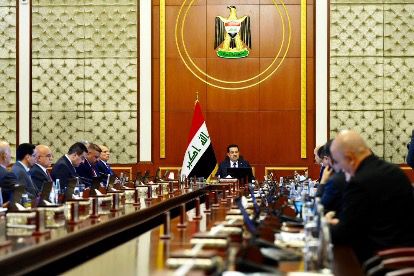“Baghdad’s Political Mentality Continues to Punish Kurdistan Region’s Civil Servants”
On October 27, 2022, the coalition government led by Mohammed Shia Al-Sudani received a vote of confidence in Iraq’s Council of Representatives and presented its ministerial program, which all coalition parties (including Kurds, Shiites, and Sunnis) had agreed upon. The program was supposed to resolve all issues between Erbil and Baghdad, especially financial matters, but Baghdad continues to punish Kurdistan Region’s employees to this day.
Segvan Sindi, a Kurdistan Democratic Party parliamentarian in Iraq’s Council of Representatives, told Kurdish Globe: “The program agreed upon with Baghdad had two parts. One part required new legislation to be passed by parliament, such as the Federal Council Law, Federal Oil and Gas Law, and several other laws. The other part was related to the government, including implementing the Sinjar Agreement, reactivating Article 140 committee, preparing the federal government law project in cooperation with the Kurdistan Regional Government, etc.”
He added: “Unfortunately, the current mentality running Iraq is creating obstacles to implementing this program within Iraq’s constitutional framework, which has led to emptying much of this program’s content or preventing its proper implementation.”
In 2023, at the beginning of Sudani’s government, the Iraqi Council of Representatives’ main task was approving Iraq’s budget for 2023-2024-2025. Initially, through coordination between the federal government and Kurdistan Regional Government, a balanced budget project was drafted. However, in parliament, factions that still view Kurdistan’s people and government with a chauvinistic mentality modified the project’s articles in a way that once again deprived Kurdistan Region of its financial entitlements and employee salaries.
The article continues with detailed explanations of the budget allocation issues, the suspension of Kurdistan’s oil exports since March 2023, and comments from political observer Shirin Abdulrahman Dino, who emphasizes that Kurdistan could be self-sufficient if allowed to export its oil and that the current situation amounts to collective punishment of Kurdistan Region’s people.
The core issue remains that Baghdad continues to withhold financial entitlements and salaries from Kurdistan Region using various pretexts, creating an unsustainable situation that requires fundamental solutions rather than continued collective punishment of Kurdistan’s population.
The KDP parliamentarian also revealed that the main trick for depriving Kurdistan Region’s employees of their salaries (who should receive their salaries on time like all other Iraqi state employees) is that in Iraq’s budget law project, Kurdistan Region employees’ salaries are included within the Region’s 12.6% share rather than being allocated separately like other civil servants’ salaries in the federal budget. Therefore, when they talk about giving Kurdistan Region 12.6% of the “actual spending,” Kurdistan’s share is reduced by approximately 50%, making it impossible for the Kurdistan Regional Government to provide employee salaries. This is despite the fact that during the budget law drafting process, Kurdistan Region’s 12.6% share was supposed to be allocated from the total federal budget.
He also highlighted that cutting Kurdistan Region’s financial shares and entitlements by the Iraqi government is not new – this Baghdad policy against Kurdistan Region has been ongoing since 2014. However, what has made it particularly noticeable since March 2023, preventing the Kurdistan Regional Government from providing employee salaries as before, is that since March 2023, following the Paris Court Committee’s decision (where Iraq had filed a complaint against Turkey), Kurdistan Region’s oil exports through Turkey to the global market have been suspended. In response, the Iraqi government, using various pretexts, has turned the suspension of Kurdistan’s oil exports into an economic weapon to punish the Kurdistan Region. Clearly, cutting employee salaries and the region’s share is just one of many suspended issues between Erbil and Baghdad, and there are other accumulated problems that, if appropriate solutions within Iraq’s constitutional framework are not found, will make it very difficult for the current situation to continue.
Regarding this matter, Shirin Abdulrahman Dino, a political observer, told Kurdish Globe: “If Kurdistan could export its oil now, not only would it not need Iraq’s budget, but it might even be able to return some of its revenue to the federal government. This would be the first time in Iraq’s history that some provinces could sustain themselves and not be a burden on Iraq’s budget.”
She added: “All of Kurdistan’s financial entitlements should come from Baghdad to Kurdistan, but unfortunately, every year, using various pretexts, they withhold Kurdistan employees’ salaries for several months and refuse to send financial entitlements. This situation cannot continue – this problem must be solved from its roots, as what’s happening is collective punishment of Kurdistan Region’s people.”

